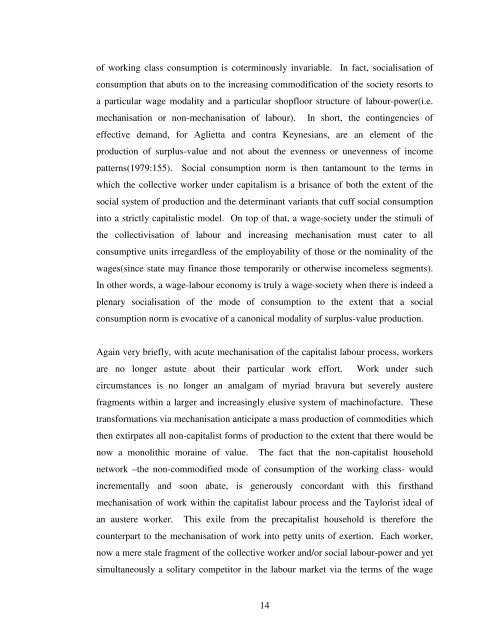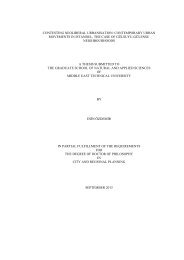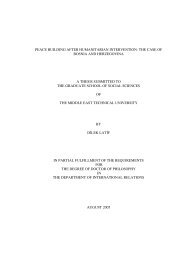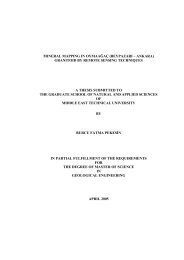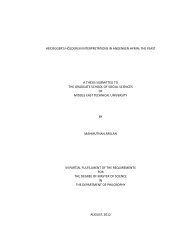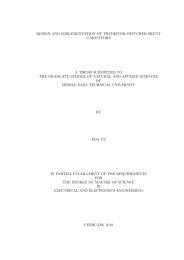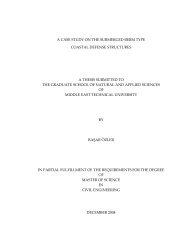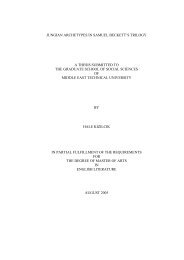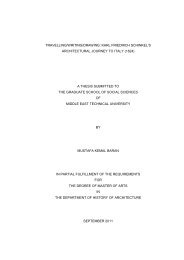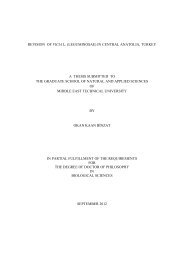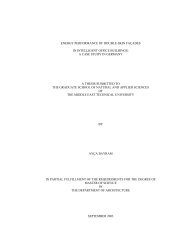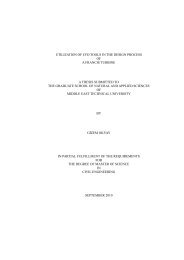View Original - Middle East Technical University
View Original - Middle East Technical University
View Original - Middle East Technical University
You also want an ePaper? Increase the reach of your titles
YUMPU automatically turns print PDFs into web optimized ePapers that Google loves.
of working class consumption is coterminously invariable. In fact, socialisation of<br />
consumption that abuts on to the increasing commodification of the society resorts to<br />
a particular wage modality and a particular shopfloor structure of labour-power(i.e.<br />
mechanisation or non-mechanisation of labour). In short, the contingencies of<br />
effective demand, for Aglietta and contra Keynesians, are an element of the<br />
production of surplus-value and not about the evenness or unevenness of income<br />
patterns(1979:155). Social consumption norm is then tantamount to the terms in<br />
which the collective worker under capitalism is a brisance of both the extent of the<br />
social system of production and the determinant variants that cuff social consumption<br />
into a strictly capitalistic model. On top of that, a wage-society under the stimuli of<br />
the collectivisation of labour and increasing mechanisation must cater to all<br />
consumptive units irregardless of the employability of those or the nominality of the<br />
wages(since state may finance those temporarily or otherwise incomeless segments).<br />
In other words, a wage-labour economy is truly a wage-society when there is indeed a<br />
plenary socialisation of the mode of consumption to the extent that a social<br />
consumption norm is evocative of a canonical modality of surplus-value production.<br />
Again very briefly, with acute mechanisation of the capitalist labour process, workers<br />
are no longer astute about their particular work effort. Work under such<br />
circumstances is no longer an amalgam of myriad bravura but severely austere<br />
fragments within a larger and increasingly elusive system of machinofacture. These<br />
transformations via mechanisation anticipate a mass production of commodities which<br />
then extirpates all non-capitalist forms of production to the extent that there would be<br />
now a monolithic moraine of value. The fact that the non-capitalist household<br />
network –the non-commodified mode of consumption of the working class- would<br />
incrementally and soon abate, is generously concordant with this firsthand<br />
mechanisation of work within the capitalist labour process and the Taylorist ideal of<br />
an austere worker. This exile from the precapitalist household is therefore the<br />
counterpart to the mechanisation of work into petty units of exertion. Each worker,<br />
now a mere stale fragment of the collective worker and/or social labour-power and yet<br />
simultaneously a solitary competitor in the labour market via the terms of the wage<br />
14


